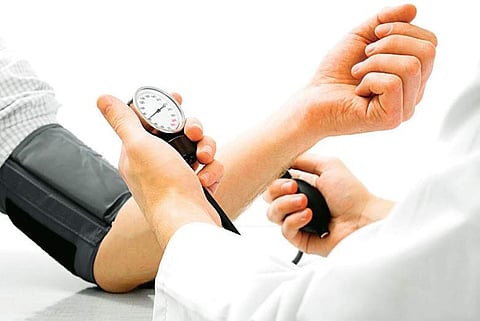

BENGALURU: High blood pressure kills more than 7 million individuals every year, affecting 972 million of world population. Hypertension is defi ned as having an average blood pressure of above 140/90, based on an average of two or more readings taken on two or more occasions. Aiming for a much lower systolic pressure of 120 or less is very benefi cial. While there is no cure, using medications as prescribed and making positive lifestyle changes can help enhance your quality of life and reduce your risk of heart disease, stroke and kidney disease
Types of Hypertension
Primary or Idiopathic Hypertension, also called essential hypertension and ‘the silent killer’, constitutes 90 per cent of the patients with high blood pressure. Secondary Hypertension: Approximately 5 per cent of patients with hypertension have a secondary etiology that leads to an elevation in blood pressure. Isolated systolic hypertension can lead to serious health problems, such as stroke, heart disease and chronic kidney disease. Some people only have high systolic blood pressure and this is called isolated systolic hypertension. Many older adults have this condition. This can cause as much harm as HBP. Normal blood pressure indicates relatively healthy organs, cardiovascular, kidney and liver. About 60 per cent of people with diabetes also have hypertension. As a rule of thumb the lower the blood pressures the lower the risk.
A Warning Sign
Pre-hypertension needs immediate treatment. Blood pressure measuring BP 120- 139 /80-89 mm of Hg is an indication of hypertension.One out of four patients have pre-hypertension, and they have two times the risk of heart disease compared with those with normal blood pressure. Contraceptives, cold remedies, decongestants, over-the-counter pain relievers, and some prescription drugs may cause a temporary rise in blood pressure leading to pre-hypertension. Early clogging of arteries – atherosclerosis – also can cause pre-hypertension. Obstructive sleep apnea, kidney disease, adrenal disease and thyroid imbalances are other causes.
Pre Treatment
Losing weight if overweight or obese, eating a healthy low-salt diet and regular exercise can go a long way in reducing the chances of developing hypertension. Limit alcohol consumption and most importantly quit smoking.
Malignant Hypertension?
BP of 180/110 or higher needs urgent treatment as this is called Malignant Hypertension. Its also known as hypertensive crisis andcan lead to stroke, kidney damage, heart attacks, or loss of consciousness.
Treatment
In presence of an organ damage blood pressure medications will be given through an IV, in hopes of lowering blood pressure within minutes. Oral medication will be given once blood pressure has been lowered to a safe level. Often needs institutional treatment. Sodium in salt raises blood pressure by promoting the retention of fl uid by the body. Processed foods are particularly high in sodium and make up about 75 per cent of intake of dietary sodium. State of constant stress and consumption of too much alcohol can lead to long-term increased blood pressure. Caffeine is also known to perpetuate hypertension. Toxemias of pregnancy may lead to hypertensive crisis. Gestational hypertension generally develops after 20 weeks of pregnancy. If not properly managed, it may develop into preeclampsia.
HBP in Children
Children are at higher risk for hypertension if they are overweight or if they have a family history. DASH diet, which stands for Dietary Approaches to Stop Hypertension recommends eating more vegetables, fruits, whole grains, low-fat dairy products, poultry, nuts, and fi sh. Red meat, saturated fats, and sweets should be avoided. Exercise is another lifestyle factor that can lower blood pressure- 150 minutes per week of moderate exercise. This can include cardiovascular exercises such as walking, bicycling, gardening, or other aerobic exercise. Water pills is another option. If diet and exercise are not suffi cient to lower blood pressure, the fi rst medications recommended are often diuretics. Meditation and other relaxation techniques including yoga, tai chi, and breathing exercises can also help reduce blood pressure.
The expert is a former director of Sri Jayadeva Institute of Cardiology, former VC Bangalore University and former chairman of Karnataka State Health Commission